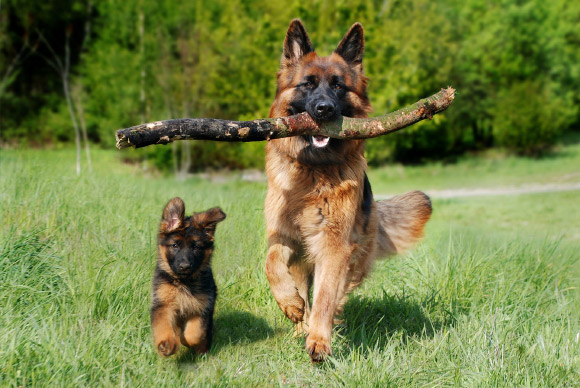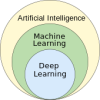A new study led by a Duke University researcher supports the idea that domestication enhanced the cooperative-communicative abilities of dogs as selection for attraction to humans altered social maturation.
Source: Sci News
“Dogs are born with the innate ability to understand that we’re communicating with them and we’re trying to cooperate with them,” said lead author Hannah Salomons, a doctoral student at Duke University.
In the study, Salomons and colleagues compared 44 dog and 37 wolf puppies (5-18 weeks old) on a battery of temperament and cognition tasks.
In one test, the researchers hid a treat in one of two bowls, then gave each dog or wolf puppy a clue to help them find the food.
In some trials, they pointed and gazed in the direction the food was hidden. In others, they placed a small wooden block beside the right spot — a gesture the puppies had never seen before — to show them where the treat was hidden.
The results were striking: even with no specific training, dog puppies as young as 8 weeks old understood where to go, and were twice as likely to get it right as wolf puppies the same age who had spent far more time around people.
Seventeen out of 31 dog puppies consistently went to the right bowl. In contrast, none out of 26 human-reared wolf pups did better than a random guess.
Control trials showed the puppies weren’t simply sniffing out the food. Even more impressive, many of the dog puppies got it right on their first trial.
“It’s not about which species is smarter,” Salomons said.
“Dog puppies and wolf puppies proved equally adept in tests of other cognitive abilities, such as memory, or motor impulse control, which involved making a detour around transparent obstacles to get food.”
“It was only when it came to the puppies’ people-reading skills that the differences became clear.”
Other tests showed that dog puppies were also 30 times more likely than wolf pups to approach a stranger.
“With the dog puppies we worked with, if you walk into their enclosure they gather around and want to climb on you and lick your face, whereas most of the wolf puppies run to the corner and hide,” Salomons said.
And when presented with food inside a container that was sealed so they could no longer retrieve it, the wolf pups generally tried to solve the problem on their own, whereas the dog puppies spent more time turning to people for help, looking them in the eye as if to say: I’m stuck can you fix this?
“This study really solidifies the evidence that the social genius of dogs is a product of domestication,” said Duke University’s Professor Brian Hare, senior author of the study.
“It’s this ability that makes dogs such great service animals, It is something they are really born prepared to do.”
“Much like human infants, dog puppies intuitively understand that when a person points, they’re trying to tell them something, whereas wolf puppies don’t.”
“We think it indicates a really important element of social cognition, which is that others are trying to help you.”
The study was published in the journal Current Biology.
Source: Sci News

































Leave a Comment
You must be logged in to post a comment.